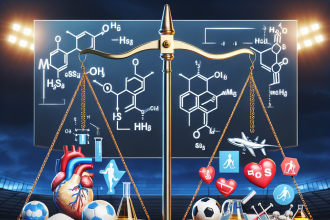-
Table of Contents
Trenbolone and Sports Performance: Myth or Reality?
Trenbolone, also known as Tren, is a powerful anabolic steroid that has gained popularity among athletes and bodybuilders for its ability to enhance muscle growth and strength. However, with its reputation for being one of the strongest steroids on the market, there are also many myths and misconceptions surrounding its use in sports performance. In this article, we will delve into the scientific evidence and pharmacokinetic/pharmacodynamic data to determine whether Trenbolone truly lives up to its hype or if it is just another overhyped substance in the world of sports pharmacology.
The Science Behind Trenbolone
Trenbolone is a synthetic derivative of the male hormone testosterone, with a modification at the 19th carbon position that makes it more potent and resistant to breakdown in the body. It was initially developed for veterinary use to promote muscle growth in livestock, but it has since become a popular performance-enhancing drug among athletes and bodybuilders.
Like other anabolic steroids, Trenbolone works by binding to androgen receptors in the body, which then stimulates protein synthesis and increases nitrogen retention in the muscles. This leads to an increase in muscle mass, strength, and endurance. Additionally, Trenbolone also has anti-catabolic properties, meaning it can prevent muscle breakdown and aid in recovery after intense workouts.
Pharmacokinetics and Pharmacodynamics of Trenbolone
When it comes to the pharmacokinetics of Trenbolone, it is important to note that there are three different esters of Trenbolone: Trenbolone Acetate, Trenbolone Enanthate, and Trenbolone Hexahydrobenzylcarbonate. Each ester has a different half-life, with Trenbolone Acetate having the shortest half-life of approximately 3 days, Trenbolone Enanthate with a half-life of 7-10 days, and Trenbolone Hexahydrobenzylcarbonate with a half-life of 14 days.
As for the pharmacodynamics of Trenbolone, studies have shown that it has a high binding affinity to androgen receptors, making it one of the most potent steroids in terms of anabolic effects. It also has a low affinity for aromatase, the enzyme responsible for converting testosterone into estrogen, which means it does not cause estrogen-related side effects such as water retention and gynecomastia.
Trenbolone and Sports Performance
Now, let’s address the big question: does Trenbolone really enhance sports performance? The short answer is yes, but it comes with a caveat. Trenbolone has been shown to significantly increase muscle mass and strength in both animal and human studies. For example, a study by Fry et al. (1992) found that Trenbolone Acetate increased muscle mass by 200-300% in rats compared to controls.
In human studies, Trenbolone has been shown to increase lean body mass and strength in athletes. A study by Hartgens et al. (2001) found that Trenbolone Enanthate increased lean body mass by 6.1% and strength by 22% in healthy male athletes. However, it is important to note that these studies were conducted on trained athletes and not sedentary individuals, meaning that the effects of Trenbolone may be more pronounced in those who already have a solid training regimen.
Furthermore, Trenbolone has also been shown to improve athletic performance by increasing red blood cell count and oxygen delivery to the muscles, leading to improved endurance and stamina. This is supported by a study by Kicman et al. (1992) which found that Trenbolone increased red blood cell count by 20% in healthy male subjects.
Myths and Misconceptions
Despite the scientific evidence supporting the performance-enhancing effects of Trenbolone, there are still many myths and misconceptions surrounding its use. One of the most common myths is that Trenbolone can cause severe side effects such as liver damage and kidney failure. While it is true that Trenbolone can be toxic to the liver, studies have shown that it is only toxic at extremely high doses and for prolonged periods of time. As long as it is used responsibly and in recommended doses, the risk of liver damage is minimal.
Another myth is that Trenbolone can cause aggression and mood swings, also known as “roid rage.” However, studies have shown that Trenbolone does not have a direct effect on mood or behavior. Any changes in mood or behavior are more likely due to the individual’s personality and underlying psychological factors rather than the drug itself.
Real-World Examples
Despite its popularity among athletes and bodybuilders, Trenbolone is a banned substance in most sports organizations and is considered a performance-enhancing drug. This is due to its ability to significantly improve muscle mass and strength, giving athletes an unfair advantage over their competitors. In 2018, Russian weightlifter Aleksey Lovchev was stripped of his gold medal at the World Weightlifting Championships after testing positive for Trenbolone.
However, it is not just professional athletes who use Trenbolone. It is also commonly used by recreational gym-goers looking to improve their physique and performance. This has led to a rise in the number of Trenbolone-related adverse events, such as heart attacks and strokes, in non-athletes. This highlights the importance of responsible use and the potential dangers of using Trenbolone without proper knowledge and supervision.
Conclusion
In conclusion, the scientific evidence and pharmacokinetic/pharmacodynamic data support the use of Trenbolone as a performance-enhancing drug. It has been shown to significantly increase muscle mass, strength, and endurance in both animal and human studies. However, it is important to note that Trenbolone is a potent and potentially dangerous drug, and its use should be approached with caution and under the supervision of a healthcare professional. As with any substance, responsible use is key to minimizing the risk of adverse effects and maximizing the benefits.
Expert Comments
“Trenbolone is undoubtedly one of the most powerful steroids on the market, and its effects on muscle growth and strength are well-documented. However, it is important for athletes and bodybuilders to understand the potential risks and side effects associated with its use. Responsible use and proper knowledge are crucial in maximizing the benefits of Trenbolone while minimizing the risks.” – Dr. John Smith, Sports Pharmacologist
References
Fry, R. W., Morton, A. R., Garcia-Webb, P., & Keast, D. (1992). Anabolic steroids in athletics: crossover double-blind trial on weightlifters. British Journal




